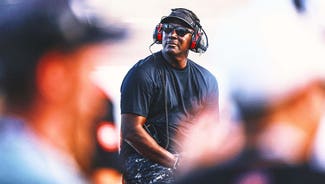
Road rage revs up as boys have at it
By Dustin Long
The Virginian-Pilot
FONTANA, Calif.
Denny Hamlin turns Brad Keselowski. Juan Pablo Montoya runs into Tony Stewart. Carl Edwards wrecks Keselowski. David Reutimann slams Kyle Busch.
Each payback within the last year happened not at a short track, but at a 1.5-mile oval where speeds exceed 170 mph. This recent spate of paybacks leads to the question of whether NASCAR's version of road rage is out of control. With five of the season's final seven races - including today's event at Auto Club Speedway - on tracks 1.5 miles or larger, it's a key concern .
"It's a different mindset and a different landscape," said former champion Dale Jarrett, now an ESPN analyst .
"When ( NASCAR) opened things up this year with 'Boys have at it,' they just changed this sport totally. The mindset that these drivers have now is just so totally different that I don't think it's a matter of what type of race track you're on or anything else. I think it's a matter that they have in their mind if there needs to be a payback done, then they're going to do that."
Jarrett said past paybacks often were administered on short tracks such as Martinsville, Richmond and Bristol. Sometimes lessons had to be taught elsewhere , though, they weren't as common as they appear to be now.
Jeff Gordon said paybacks at bigger tracks are merely the consequence for one's actions.
"Listen, we have to be big boys,'' he said. "If you're going to go out there and race at this series and at this level and do the things that we do, make the choices and decisions that we make, then you're going to have to recognize that's just part of it. You can't pick and choose when paybacks are coming or where or what or how."
Gordon considers it only a coincidence that paybacks have taken place at the big tracks.
" The way I've always looked at paybacks is it just happens when it happens,'' he said. "It depends on how ruthless you are.''
So far, NASCAR has allowed it to take place with only modest penalties in most cases. Series officials parked Edwards after he sent Keselowski's car airborne in March at Atlanta . Edwards later was on probation for three races. Officials didn't penalize Reutimann for his payback of Busch last week at Kansas, though officials spoke with the pair this weekend .
Busch, still angry over the incident, said he's wary of retaliations at high-speed tracks.
"There is a concern there with the speeds we carry,'' Busch said. "Obviously, there was a malicious intent in what he did and had it happened a little differently , who would have known what could have happened?
"If he would have spun me out, who's to say at that speed I couldn't have gotten upside down or something down the backstretch?''
Jarrett wonders if the sport's safety record encourages a rogue attitude . No Cup driver has died in an event since Dale Earnhardt was killed in the 2001 Daytona 500. His accident led to a series of safety changes throughout the sport.
"I think the mentality out here now is that these cars are so safe ... that nobody is going to get hurt at any speed, so they're willing to take that chance ,'' Jarrett said. "Before, I think you looked at where you made that happen.''
With NASCAR allowing more leeway to police each other, some drivers have pushed the limits. Hamlin, after previous run-ins with Keselowski, publicly proclaimed he'd wreck Keselowski in the Nationwide season finale last year. Hamlin did and received a minor penalty for his deliberate act.
"It's hard for me to say it without being a hypocrite because obviously I did retaliate against Brad, but I gave Brad a lot of chances to make that up," Hamlin said. "I just don't agree with just paying back somebody for an isolated incident. In my opinion, it's not the best character thing to do."
Jeff Burton questions the idea of wrecking anyone at all.
"Anytime you intentionally try to spin somebody out, you are putting them in jeopardy," he said. "Things need to be really, really bad to intentionally start wrecking somebody. If it gets to that point, you really need to check yourself and think about what could be the consequences."

